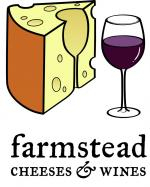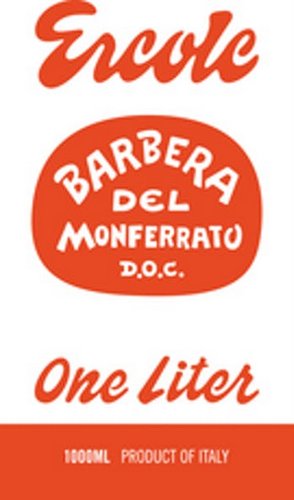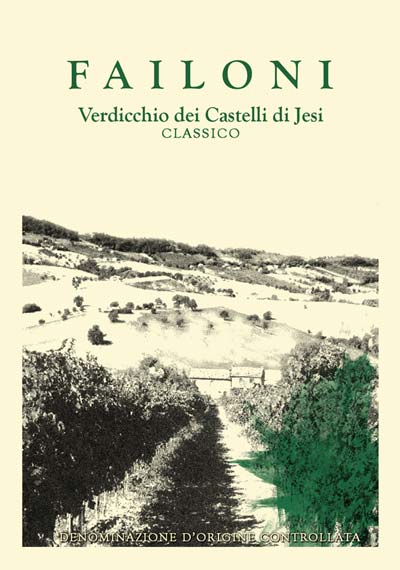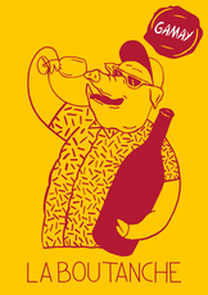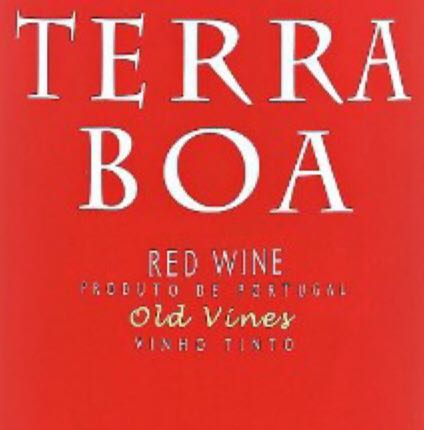Ercole Bianco and Barbera di Monferrato (Organic)
Falloni Verdicchio dei Casteli di Jesi Classico – Organic
D & C Tripoz Bourgogne Blanc Vieilles Vignes – Organic
La Boutanche Gamay Rouge – Organic and Natural
Falloni Rosso Piceno – Organic
Folk Machine Red Blend Parts and Labor, Sustainable
Terra Boa Tinto – Sustainable
Yves Cuilleron IGP Roussanne Les Vignes d’à Côté – Organic practices
Dom du Salvard Cheverny blanc – Sustainable with organic practices
L’arco rosso del Veronese IGT – organic and natural
Yves Cuilleron IGP syrah Les Vignes d’à Côté – Organic Practices
Ercole Bianco and Barbera di Monferrato (Organic)
Weston Hoard spent four years living in Piedmont and working for renowned winemaker Paolo Scavino. When he returned to the United States in 2011, he determined to channel his experience in Italy into a new importing project which he named “The Piedmont Guy.” The company “does Piedmont,” and only Piedmont.
Ercole is a project aimed at honoring the work of the unsung heroes of Italy — the grape growers themselves. Ercole, whose English translation is Hercules, is only made possible by a generations-old cooperative of local growers in the Monferrato area. Every fall, these men and women cultivate bright and balanced fruit, allowing us to make real wines that are transmitters of time and place. The place, Monferrato, ranks among the most historic grape-growing areas of Piedmont. The fruit from this overlooked area gives us Ercole, a family of wines offering remarkable value. Enjoy these one-liter, screw-top bottlings unconditionally. Salute!
The cooperative behind Ercole works predominantly with old vines ranging from 30 to 50 years old. All participating growers adhere to the European Union rule for sustainable farming known as lotta integrata, or lutte raisonnée, though many are now certified organic. None of these growers use systemic treatments or chemicals, employing only minimal copper and sulfur. Both vinification and bottling are certified vegan.
The place, Monferrato, ranks among the most historic grape-growing areas of Piedmont and is the confirmed birthplace of the Barbera grape. For these reasons, we work primarily with Monferrato’s indigenous grape varieties. The fruit from this increasingly popular area gives us Ercole, a family of wines offering remarkable value.
At their best, wines made from the native grape variety Cortese boast a serious yet pleasing weight, pronounced minerality, and beautiful acidity. In fact, the Cortese-based wines of nearby Gavi are among the most treasured whites of Northern Italy. We have discovered that adding a touch of Chardonnay and Sauvignon Blanc further sharpens and thereby elevates this wine.
This Barbera offers fresh aromas and flavors of raspberries, blueberries, and cherries. Unlike other regions of Piedmont, Monferrato still offers quality Barbera at a profound value. The origin of Barbera likely dates back to the 7th century, and many believe the hills of Monferrato to be the grape’s original birthplace. Monferrato Barbera yields vibrant aromatics, bright red fruits, and finesse.
Falloni Verdicchio dei Casteli di Jesi Classico – Organic
Winemaker Antonio Failoni is one of just three vine growers crafting wine in the Esino Rosso appellation, in the heart of the Marche. Named after the river that runs through this region of verdant, rolling hills, and ancient olive trees, this wine reveals the heartfelt connection between the land and this modest family estate.
While Antonio wasn’t born into a winemaking family, he knew early on that it was his true calling, inspired by the enticing aromas of fermenting grapes from a neighboring cantina when he was still young. He decided to realize his dream in the Marche after a family holiday, seduced by the region’s peaceful landscape, healthy vineyards, and ancient villages.
For some 25 years, Antonio has purchased land, plot by plot, in and around the medieval village of Staffolo. Cared for organically, his 50 acres – 10 acres of vines and 10 of 200-year-old olive trees, the rest wild countryside—benefit from a particular microclimate. Here the warming influence of the Adriatic Sea and the cool winds off the Apennine Mountains combine to create an ideal balance for grape growing.
Failoni wines are character-rich, speaking passionately and honestly about the Marche’s inspiring landscape and its native flavors.
Estate vineyards sit at 1,200 feet above sea level on a series of rolling hills and face south/southeast. Soils are mostly sandy, with veins of limestone. Antonio cares for both his vineyards and olive trees according to organic principles but is not officially certified.
Marche’s native white grape, Verdicchio has been cultivated here since at least the fourteenth century. With its light gold-green hue and sea-salty finish (a nod to the nearby Adriatic Sea), this is a refreshing, savory white tailor-made for fresh seafood. Hand-harvested, then directly pressed into tank where indigenous yeasts ferment the grapes. The juice sits on the fine lees for six months.
Aromas of lemon blossoms, grapefruit zest. Juicy yet balanced and refined; citrus and light almond on the finish. PAIRING SUGGESTIONS: Fresh seafood such as oysters or clams; risotto with spring vegetables.

D & C Tripoz Bourgogne Blanc Vieilles Vignes – Organic
This wine comes from a charming husband-and-wife team working for the last 30 years in the Mâcon, Burgundy’s “sunny” southern-most region. The grapes are from a nearly 65-year-old, organically cultivated five-acre vineyard located right behind the winery.
Vinified traditionally in mostly used 225 liter Burgundy barrels, the wine goes through primary and secondary (malolactic) fermentation on the fine lees, with regular batonnage for nine months before bottling.
Opulent, powerful apple aromas. Rich, creamy and full-bodied, this is a weighty, imposing wine with masses of fruit but enough balancing acidity. Good length.
La Boutanche Gamay Rouge – Organic and Natural
The “La Boutanche” label is a collaborative effort with importer Selection Massale to source tasty and affordable organic, minimalist wines from sought-after producers.
Winemaker Olivier Minot is the force behind this incredible cuvée. 100% Gamay from Southern Beaujolais, the grapes are harvested from 90-year-old vines, fermented and aged in concrete tanks, and bottled with minimal sulfur.
Fresh-picked cherry, raspberry, and candied strawberry flavors mingle with spicy, woody notes of black tea, tilled soil, and forest floor. Sophisticated yet totally quaffable, this is a far more serious wine than the label indicates, and in a 1L bottle, a serious value too! This is sure to be your new go-to: like your favorite pair of blue jeans, it can be dressed up or down to suit almost any occasion! Organically grown, low-intervention/natural wine, vegan.
Chill it down and serve with lighter fare.

Falloni Rosso Piceno – Organic
Please scroll up for a description of the winery and winemaker.
The Rosso Piceno bottling is a blend of estate-grown Montepulciano (45%), Sangiovese (45%), and Merlot (10%) from 15+ year old vineyards. The grapes were hand-harvested. destemmed; fermented on indigenous yeasts in temperature-controlled tanks. Aged in stainless steel tank and in very large Slavonian casks (30,000 liters) for one year before bottling.
An easy-drinking wine that goes with many foods. Look for notes of red currant, wild strawberry, licorice. Fresh and juicy, with a spicy finish.

Folk Machine Parts and Labor Red – sustainable
The Hobo Wine Company is the brainchild of Kenny Likitorakong. Despite knowing better, he started his own label in 2002 with the simple idea to have some good fun.
Since then, he has created several labels Hobo, Camp, Parts and Labor, Banyan, etc. His wines are honest, well-priced, varietally correct, and whimsically packaged. In short – a natural choice for an independent wine shop.
Voted one of Food and Wine‘s 25 of Our Favorite Under-the-Radar California Reds in 2018, this balanced red blend of 58% Redwood Valley Carignane, 26% Potter Valley Syrah, 11% Arroyo Seco Grenache, and 5% Redwood Valley Barbera is just the ticket for an everyday red to go with, well, everything.
A hodgepodge of California grapes including Syrah, Grenache, Carignan and Barbera, this bottle is perfect for those that love a dry red wine. The wines of Folk Machine come from the same producer as Hobo wines, many of which have garnered impressive critical acclaim.
Each lot was brought into the winery separately and fermented in stainless steel tanks. All fermentation was uninoculated and malolactic proceeded spontaneously. The base blend was made in December and the final blend was made before bottling. Aged 75% in stainless steel tanks and 25% in oak foudre tanks.
Here are Kenny’s principles (you can see that he is a good egg):
“The Hobo Wine Company is committed to a value system that extends beyond financial progress. We believe a business has an effect on its micro and macro communities and an obligation to better both.
We stand behind the Black Lives Matter movement to fight for freedom, liberation, and justice, and along with the environmental crisis believe these are the most pressing issues of our time.
All of the 70 acres of vineyard that we lease are organically farmed and 88% of the total vineyards that we source from are sustainably, organically, or biodynamically farmed. Our winery is powered by local renewable sustainable geothermal energy via Sonoma County’s Evergreen Clean Power program. We are continually working to improve the environmental impact of our package.
Labels are printed using HP’s environmentally friendly Indigo ElectroInk on 100% post-consumer recycled paper. Capsules were discontinued in 2005 – as far as we know, we were the first winery in California to do this. We use 100% Antique Green glass to ensure the highest percentage of recycled material in our bottles. We use all domestic glass to reduce the petrol needed for transportation. We continue to use natural corks and natural cork products because they have a lower carbon footprint to produce and are more recyclable, reusable, and compostable compared to cork alternatives.
We are members of 1% for the Planet and donate 1% of our gross revenue from all of our brands to non-profit environmental organizations. Since joining, we have donated over $60,000. To support the fight against racism, we give financially to Black Lives Matter, the NAACP Legal Defense Fund, and Fair Fight. In 2017 and 2019 we hosted and organized ping pong tournaments with other businesses in our community that has raised over $70,000 benefitting The School Box Project, a non-profit that provides mobile, trauma-informed education, art, and play to children displaced by crisis.”
Terra Boa
We’re always on the hunt for inexpensive Tuesday night wines here at Farmstead. You know, the kinds of wines that you joined the Bargain Club for – and I increasingly look to Portugal for many of these wines, the result of having spent some time there, but also because of the amazing values that come from this generally overlooked wine-producing country!
Terra Boa is produced in mountainous Northeast Portugal from native grape varieties of very old vines. A blend of predominantly Touriga Nacional and Tinta Roriz, from Alianca’s 900 acre Quinta d’Aguiar property in Figueira de Castelo Rodrigo in Beiras. Nearly 200 acres are now planted with these varieties, in schist soils. Fermentation and aging take place in stainless steel.
Terra Boa has a rounded approachable style with ripe blackberry fruit flavors, aromas of ripe bramble fruit, plum, and a touch of spice, dry, medium-bodied with soft fruit and moderate tannins – a fresh and modern take on unoaked Portuguese reds!!

Yves Cuilleron IGP Roussanne Les Vignes d’à Côté – Organic practices
The Cuilleron family Domaine, located in the hamlet of Verlieu (part of the town of Chavanay) was founded several generations ago (1920). Yves Cuilleron’s grandfather was the first to bottle wine for commercial purposes in 1947. Antoine Cuilleron, the uncle and immediate predecessor of Yves, assumed control of the Domaine in 1960 and significantly increased the percentage of wine bottled at the estate and extended the scope of the Domaine. Yves assumed full ownership and direction of the Domaine in 1987 and, since that time, has built an entirely new facility while at the same time acquiring additional vineyard property. The Domaine is now (as of 2012) significantly larger in scope with 52 hectares of vineyards that cover multiple appellations, including principally, Condrieu, Saint Joseph Rouge and Blanc, Cote Rotie, Saint Péray, and a series of Vin de Pays from the Collines Rhodaniennes.
Yves Cuilleron has established himself as one of the leading lights of France’s Northern Rhône region. He’s a modernist, but not overly so: his wines straddle neatly the divide between traditionalists and the new-wave, in the sense that they retain their sense of place, but express their site in a slightly more approachable, immediate way. There’s a purity to the fruit, and where new oak is used it isn’t excessive.
Originating from a granitic and alluvial soil, the Marsanne has been grown following sustainable and respectful methods. In the cellar, the wine was subject to natural alcoholic and malolactic fermentation and the wine is aged for six months on its lees in vats and barriques. Therefore, the wine is generously aromatic. Look for notes of white-fleshed fruit, citrus fruits like pomelo grapefruit and blood orange, as well as white flowers. The tasty palate is balanced by wonderful freshness and ends with lovely and pleasantly bitter and fine spicy touches.
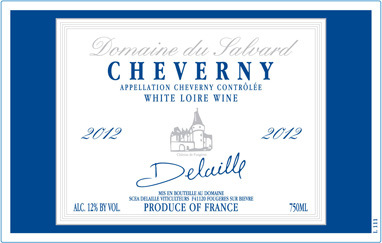
Dom du Salvard Cheverny blanc – Sustainable with organic practices
Domaine du Salvard has been a working domain since 1898, through five hardworking generations of the Delaille family. Today, all 120 acres of vineyards are farmed by the capable brother team of Emmanuel and Thierry Delaille, with help from their father Gilbert.
They have carried on the traditions established by their ancestors, producing a true, classic Cheverny that is both simple and elegant. The Delaille brothers have focused their attention on growing fresh, lively Sauvignon Blanc, deeply rooted in the sand, clay, and limestone plains of northeastern Touraine. Pinot Noir, Gamay, and Cot constitute their red grape holdings, creating youthful reds with great aromatics.
Gilbert and his sons have also made their own contributions to the heritage of the domain, including the introduction of sustainable farming practices into the vineyards, as well as temperature-controlled vinification equipment to the winery. Until finally achieving A.O.C. status in 1993, Cheverny was widely regarded as one of the best V.D.Q.S. (Vin de Qualité Superieur) of the Loire. However, some argue that this A.O.C.-in-waiting designation was a political maneuver by the I.N.A.O. to keep Cheverny’s delicious, sprightly Sauvignon Blanc out of competition with the other more famous appellations of Sancerre and Pouilly-Fumé.
The region produces red, rosé, and white wines. The whites are typically blends of “Sauvignons” (Blanc and/or Gris), with other white grapes including Chenin Blanc, Arbois, and Chardonnay. The region’s terroir, in addition to this common blending practice, distinguishes its white wines from those of the leading appellations of the eastern Loire. The wines of Sancerre and Pouilly-Fume have more prominent acidity and more mineral characteristics than those of Cheverny.
The Domaine du Salvard Cheverny Blanc is a blend of 85% Sauvignon Blanc with 15% Chardonnay. This common but not frequently discussed blend plays on the strengths of each grape variety. The Chardonnay lends roundness and softness to Sauvignon Blanc’s racy and sometimes sharp acidity.

L’arco rosso del Veronese IGT – organic and natural
Luca Fedrigo approaches winemaking and farming with a natural, minimalist approach. His philosophy evolved in his teens working alongside the famous Valpolicella guru, Giuseppe Quintarelli. The artistry of Quintarelli in the winery has blossomed in the L’Arco cuvées through a traditional style, long aging, and masterful blending.
The Estate takes its name from a stone arch, called “Arco di Giove”, and near the farmhouse where the Fedrigo family resided until a few years ago.
The “youngest” of winemaker Luca Fedrigo’s characteristically bold blends, Rosso del Veronese is the sexy two-seater sports car among the portfolio’s “luxury” labels. Sangiovese fattens up the wine and makes it both interesting and age-worthy. The grape amps up the blend’s flavor profile and brings the addition of dark cherries and a teasing hint of lavender. The finish outperforms for a medium-bodied wine, hanging on amid gripping tannins. Bold fruit, a long finish, Rosso del Veronese is a seductive bottle among Fedrigo’s range.
This wine represents an estate blend with classic Valpolicella grapes; Corvina, Rondinella, Molinara, along with the secret ingredient, Sangiovese. The Sangiovese heightens the red fruit component in the blend, a fruit-forward style with complex aromatics of herbs, underbrush, and fruit. The palate is supple and relaxed with tannin and acidity that provide texture and are only revealed in the finish creating length.
50% Corvina and Corvinone, 30% Rondinella, 15% Sangiovese Grosso, and 5% Molinara.
Keep the menu old-school traditional for this fun wine: Spaghetti and meatballs, veal parmigiana, roasted leg of lamb, grilled steak with sautéed mushrooms.

Yves Cuilleron IGP syrah Les Vignes d’à Côté – Organic Practices
The Cuilleron family Domaine, located in the hamlet of Verlieu (part of the town of Chavanay) was founded several generations ago (1920). Yves Cuilleron’s grandfather was the first to bottle wine for commercial purposes in 1947. Antoine Cuilleron, the uncle and immediate predecessor of Yves, assumed control of the Domaine in 1960 and significantly increased the percentage of wine bottled at the estate and extended the scope of the Domaine. Yves assumed full ownership and direction of the Domaine in 1987 and, since that time, has built an entirely new facility while at the same time acquiring additional vineyard property. The Domaine is now (as of 2012) significantly larger in scope with 52 hectares of vineyards that cover multiple appellations, including principally, Condrieu, Saint Joseph Rouge and Blanc, Cote Rotie, Saint Péray, and a series of Vin de Pays from the Collines Rhodaniennes.
Yves Cuilleron has established himself as one of the leading lights of France’s Northern Rhône region. He’s a modernist, but not overly so: his wines straddle neatly the divide between traditionalists and the new-wave, in the sense that they retain their sense of place, but express their site in a slightly more approachable, immediate way. There’s a purity to the fruit, and where new oak is used it isn’t excessive.
This IGP Collines Rhodaniennes wine is a single-variety Syrah cultivated sustainably by hand in granitic and alluvial soils. After an alcoholic fermentation in open vats, two weeks of maceration and fermentation with natural yeasts, the wine is matured for 8 months in vats and barrique barrels. Its ruby aspect prefaces an expressive bouquet of small, tart red berries. It is a wine to be enjoyed with beef skewers served with green tapenade for maximum enjoyment of its occasionally slightly spicy aromas. 7 months with 50% in barrels 50% in stainless steel tanks.
This wine is pleasantly aromatic with notes of refreshing green apple and delicate white flowers. On the palate, the Domaine du Salvard Cheverny Blanc is juicy with gooseberries, melon, and orchard fruits, and a hint of green herbs and lime zest. It is medium-bodied with a lingering almost savory herbal finish.

